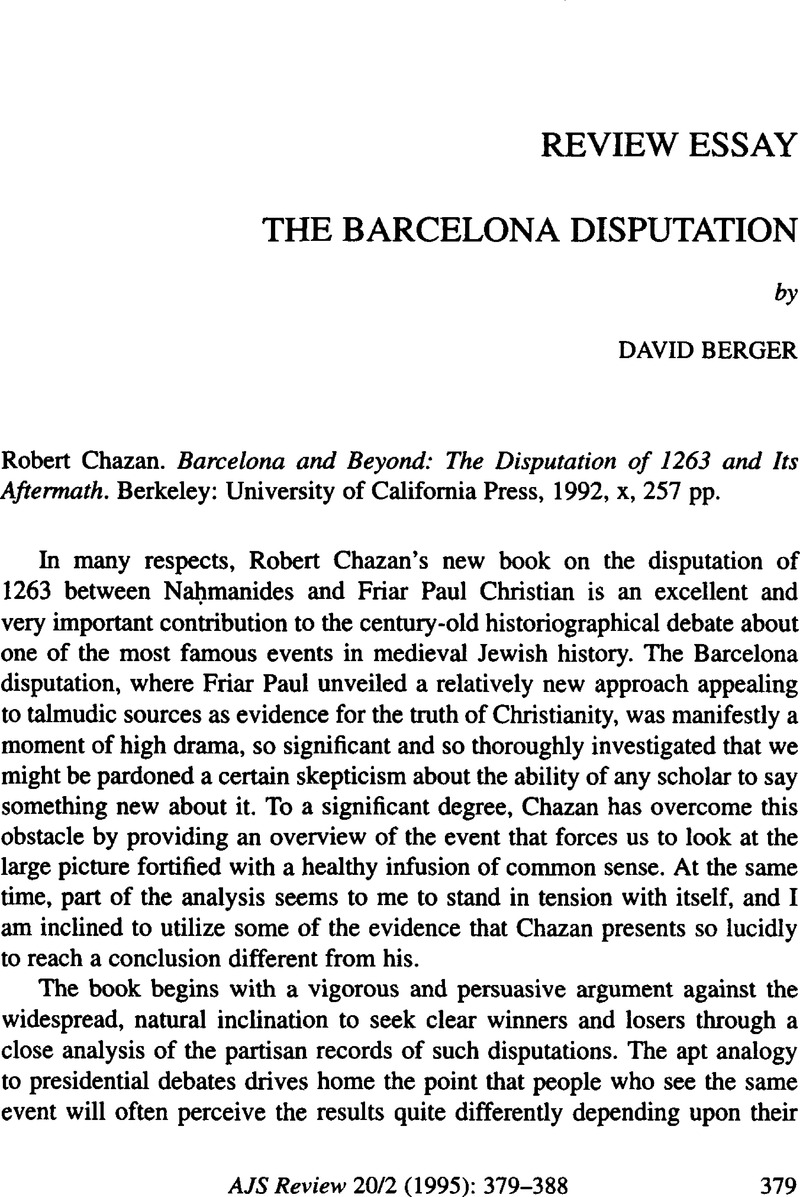Article contents
The Barcelona Disputation
Published online by Cambridge University Press: 15 October 2009
Abstract

- Type
- Review Essay
- Information
- Copyright
- Copyright © Association for Jewish Studies 1995
References
1. As Chazan notes (p. 7), the basic observation was made by Loeb, Isidore in his classic article, “La Controverse de 1263 a Barcelone entre Paulus Christiani et Moise ben Nahman,” Revue des Etudes Juives 15 (1887): 2.Google Scholar
2. Berger, D., “Mission to the Jews and Jewish-Christian Contacts in the Polemical Literature of the High Middle Ages,” American Historical Review 91 (1986): 576–591. To be sure, the strongest evidence comes from Northern Europe, but there is enough from the South to sustain the point.CrossRefGoogle Scholar
3. Loeb, “La Controverse,” p. 7.
4. Baer, Y., “Le–Bikkoret ha-Vikkuhim shel R. Yehiel mi-Paris ve-R. Mosheh ben Nahman,” Tarbiz 2 (1930–1931): 172–187.Google Scholar
5. Kitvei Ramban, ed. Chavel, C. D. (Jerusalem, 1963), p. 312. Elsewhere (p. 97), Chazan argues that the failure of the Latin account to take Nahmanides to task for his “blasphemies” would be “unthinkable” if he had really spoken as he says. I do not find this silence troubling. The Latin version is very brief and interested primarily in highlighting Nahmanides′ ineffectiveness; emphasizing his aggressiveness would have been counterproductive. Moreover, the fact that the king had allowed these statements would have made the charge of blasphemy extremely difficult to level from a political standpoint. It was the publication of the book, which the king had never permitted, that made the attack on Nahmanides politically feasible. It should also be kept in mind that for all his sharp comments, Nahmanides never claims to have said a negative word about Jesus.Google Scholar
6. Denifle, Heinrich, “Quellen zur Disputation Pablos Christiani mit Mose Nachmani zu Barcelona 1263,” Historisches Jahrbuch des Gorres-Gesellschaft 8 (1887): 239.Google Scholar
7. Even Martin Cohen′s theory of collusion between Nahmanides and the king would not provide an adequate explanation. For this conspiracy theory, which Chazan rightly rejects, see , Cohen′s “Reflections on the Text and Context of the Disputation of Barcelona,” Hebrew Union College Annual 35 (1964): 157–192. (Cohen′s close reading of the Hebrew version as a sustained account of Nahmanides′ public humiliation at Barcelona is remarkable, if unsettling, testimony to the awesome powers of human ingenuity.)Google Scholar
8. This is more or less Baer′s formulation in Toledot ha-Yehudim bi-Sefarad ha-Noserit(Tel Aviv, 1959), p. 93. I assume, for example, that the very sharp introductory paragraph of our Hebrew text, which does not represent anything that Nahmanides said at the disputation, was omitted from the copy prepared for the bishop of Gerona.Google Scholar
9. Bernard Septimus′s very brief discussion, to which Chazan makes frequent reference, is still the best treatment of this question; see his ′“Open Rebuke and Concealed Love′: Nahmanides and the Andalusian Tradition,” in Rabbi Moses Nahmanides (Ramban): Explorations in His Religious and Literary Virtuosity, ed. Isadore Twersky (Cambridge, Mass., 1983), pp. 20–22.Google Scholar
10. Kitvei Ramban,p. 319. A fair reading of this assertion is, I think, quite consistent with the sorts of changes that I believe Nahmanides did make.Google Scholar
- 1
- Cited by




